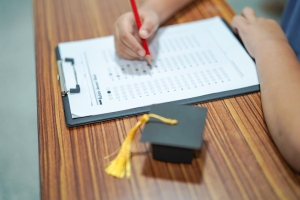Should NH allow students to test out of the requirement to attend high school?

As tuition costs continue to rise, many have questioned whether college is worth the time and money it takes to get a degree. Many students who might otherwise have pursued a bachelor’s degree are finding it more attractive to begin working and building their careers right out of high school. A somewhat similar debate that has gotten far less buzz—whether high school is really necessary—is now taking place in New Hampshire thanks to HB 399.
Let teens skip high school
HB 399 is a bill before the NH Legislature proposed by Rep. Corcoran (R-Weare). As introduced, the legislation requires the Department of Education to design and administer a high school diploma equivalency test which would exempt students age 13 or older who pass the test from school attendance requirements. The bill also allows New Hampshire citizens to sue if their rights under the new law were violated. For example, a student who tested out of having to attend high school could sue a public college if that institution refused to consider them because they didn’t go to high school.
New Hampshire law currently requires students to attend school through age 18, although 16- and 17-year-olds can take the High School Equivalency Test (HiSET) with a waiver. Most states similarly require attendance through age 16 or 18. If New Hampshire were to pass HB 399, it would be casting a new path.
An opportunity for ambitious young people
At the bill’s hearing before the House Education Committee, Rep. Corcoran argued that New Hampshire should measure “outputs” rather than “inputs”—in other words, why force someone to attend high school when they can prove they already possess the knowledge they would be taught in class? Quite a few students attended the hearing and spoke in favor of the bill. They argued that they should not be forced to go to high school, with all its social pressures and regimented structures, if they already possessed the required competencies.
Unintended consequences?
While the idea laid out in HB 399 makes sense on its face, some have raised concerns. For one, it is very difficult to design a single test which fully encompasses the knowledge gained in four years of schooling. Some have also pointed out that this bill puts the power to decide what is on that test in the hands of the state, taking away the power that local school districts would otherwise have to help determine high school standards. Of course, there would also be administrative costs to creating the test and administering it, modifying the test for students who require special accommodations, and creating new versions regularly to prevent cheating.
Similar to the debate around the importance of attending college, some bring up the social factor. High school is a pivotal time for many young people and helps them mature by socializing with their peers. Then again, for many former students, high school leaves them with painful memories they might prefer to have avoided.
What do you think?
Could allowing young people to test out of high school requirements allow them to get a jump on their futures? Or do the potential drawbacks demand greater scrutiny? A majority of the House Education Committee believes the harms outweigh the benefits, and is recommending the full House of Representatives kill the bill. The House will vote on HB 399 in the coming week.
There’s still time to share your opinion with legislators. You can find contact information for your representatives by visiting our Elected Officials page. Not sure how to reach out? Check out our Advocacy Toolkit tutorials.
Update: The House voted to table HB 399, effectively killing the bill in 2023.











Comments
Login or register to post comments